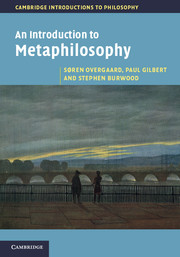2 - What is philosophy?
Published online by Cambridge University Press: 05 March 2013
Summary
Introduction
Philosophy seems to have had a somewhat disappointing career. It was once hailed as the ‘queen of the sciences’, but more recently it has been demoted to their ‘under-labourer’, if not pronounced irrelevant or ‘dead’ altogether. Yet philosophy soldiers on, if not entirely unscathed, then at most with minor cuts and bruises. The number of professional practitioners of philosophy has never been higher, and students continue to enrol in philosophy programmes. Despite its loss of prestige, then, philosophy apparently continues to appeal to human beings. But what is this thing called philosophy?
Tempting as it may be to start formulating one’s reply straightaway, it is worth pausing to consider what, precisely, the question is we are supposed to answer. As G. E. Moore once wrote:
[I]n Ethics, as in all other philosophical studies, the difficulties and disagreements, of which its history is full, are mainly due to a very simple cause: namely to the attempt to answer questions, without first discovering precisely what question it is which you desire to answer.
As we shall see, Moore’s implicit suggestion that most philosophical disagreements would go away if only philosophers would get clear on the question they want to answer before setting about answering it is probably too optimistic. Yet at least the effort to clarify what the question is might enable us to see which philosophers genuinely agree or disagree in their answers to that question and which philosophers simply debate a different question altogether. The question ‘What is philosophy?’ is very much a case in point.
Information
- Type
- Chapter
- Information
- An Introduction to Metaphilosophy , pp. 17 - 44Publisher: Cambridge University PressPrint publication year: 2013
